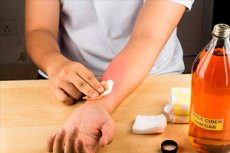Medical expert of the article
New publications
Preparations
Vinegar for skin: how it works and how it is used
Last reviewed: 29.06.2025

All iLive content is medically reviewed or fact checked to ensure as much factual accuracy as possible.
We have strict sourcing guidelines and only link to reputable media sites, academic research institutions and, whenever possible, medically peer reviewed studies. Note that the numbers in parentheses ([1], [2], etc.) are clickable links to these studies.
If you feel that any of our content is inaccurate, out-of-date, or otherwise questionable, please select it and press Ctrl + Enter.

Whatever vinegar is - ordinary table vinegar or apple vinegar - it does not belong to medicines, but in many cases vinegar for the skin, as used since ancient times home remedies with therapeutic properties, can be very useful.
Benefits of vinegar for the skin
An aqueous solution (3-9%) of chemically synthesized acetic acid (obtained by oxidation of acetaldehyde) is table vinegar; natural alcoholic vinegar is a product of oxidation (acetic acid fermentation) of ethanol (ethyl alcohol) obtained from grain, and fermentation of apple juice by bacteria of the genus Acetobacter produces apple cider vinegar. And any vinegar contains a mono-basic carboxylic acid such as acetic (ethanoic) acid. However, keep in mind that table vinegar is not as beneficial to the skin as apple cider vinegar.
In addition to acetic acid, apple cider vinegar contains malonic (malic), citric (citric), butanedioic (succinic) hydroxy acids, as well as phenolic compounds in the form of gallic, chlorogenic, oxycinnamic (p-coumaric) and 3,4-dioxycinnamic (caffeic) acids.
Due to the antimicrobial properties of acetic acid, recommendations or indications for the use of vinegar may include not only skin whitening with vinegar, but also - in addition to antibiotics and antiseptics - its use in the fight against vulgar acne, with bacterial infection of the skin (streptococcal and staphylococcal pyoderma).
What does vinegar do to the skin? With its astringent properties, natural apple cider vinegar shrinks pores and also improves blood circulation, regulates the skin's pH level, and fights blackheads and acne.
By changing the pH level of the skin, apple cider vinegar for skin fungus is used in cases of dermatomycosis such as ringworm, as well as fungal skin lesions on the feet and sweaty feet.
Apple cider vinegar for skin with hyperpigmented spots will help make them paler (thanks to hydroxy acids). And if you use vinegar for oily facial skin, you can remove excess sebum and dry up blackheads.
Vinegar helps with itching of the skin, and as an aid it is used in treatment of scabies at home. Vinegar quickly relieves itching after mosquito bites and skin irritation from sunburn.
Apple cider vinegar for allergies on the skin - in dry allergic eczema of the palms - helps not only to reduce itching, but also to facilitate the exfoliation of dead cells of the stratum corneum of the epidermis - due to the keratolytic action of alpha-hydroxy acids (in particular, apple).
Vinegar is also used externally:
- In treating demodecosis with folk remedies;
- For cuperose treatment at home;
- As an adjunctive treatment for treatment of shingles.
Can I rub vinegar on my skin? You can, widespread use for children finds rubbing with vinegar at high temperature. But what gives vodka with vinegar for the skin in such cases, it is not clear, because the rate of evaporation of such a mixture will slow down due to an increase in the amount of water.
For adults, wiping the body and/or face with water and vinegar will help with excessive sweating.
In the same cases, its external use during pregnancy is allowed.
Dosing and administration
It is clear that vinegar for the skin is applied externally. So, when sweating feet or mycosis daily or every other day make foot baths for 15-20 minutes, adding vinegar to warm: a glass of vinegar per liter of water.
To discolor pigment spots, they are wiped with apple cider vinegar diluted with water (in the proportion of 1:1).
To reduce itching on the skin areas tampon applied a mixture of two teaspoons of vinegar and a teaspoon of olive oil, kept for a quarter of an hour and washed off with warm water.
In cases of bacterial infection of the skin, it is recommended to make compresses with a vinegar solution (two tablespoons per glass in 200 ml of water).
And with ringworm, undiluted apple cider vinegar is used, which 4-5 times a day wet the affected areas (rubbing into the skin in a circular motion). Then it is necessary to apply a loose gauze bandage (each time changing it for a new one).
Contraindications
Externally, vinegar is contraindicated to use if the skin is inflamed or its integrity is violated (there are abrasions, abrasions or cuts).
Use of vinegar for sweaty feet should be avoided if you have diabetes.
Side effects Of vinegar for the skin
As a rule, side effects in the form of skin irritation, itching or burning are caused by prolonged use of undiluted vinegar.
Also, chemical burns from vinegar on the skin cannot be ruled out. For more information see. - vinegar burn
Attention!
To simplify the perception of information, this instruction for use of the drug "Vinegar for skin: how it works and how it is used" translated and presented in a special form on the basis of the official instructions for medical use of the drug. Before use read the annotation that came directly to medicines.
Description provided for informational purposes and is not a guide to self-healing. The need for this drug, the purpose of the treatment regimen, methods and dose of the drug is determined solely by the attending physician. Self-medication is dangerous for your health.

